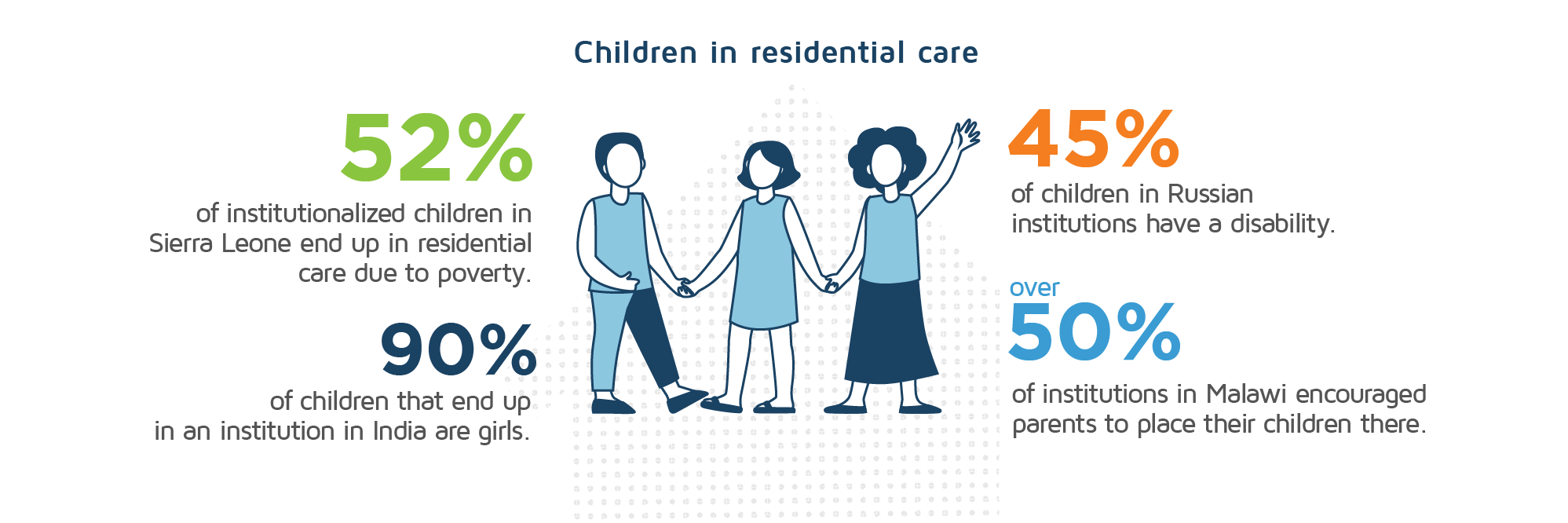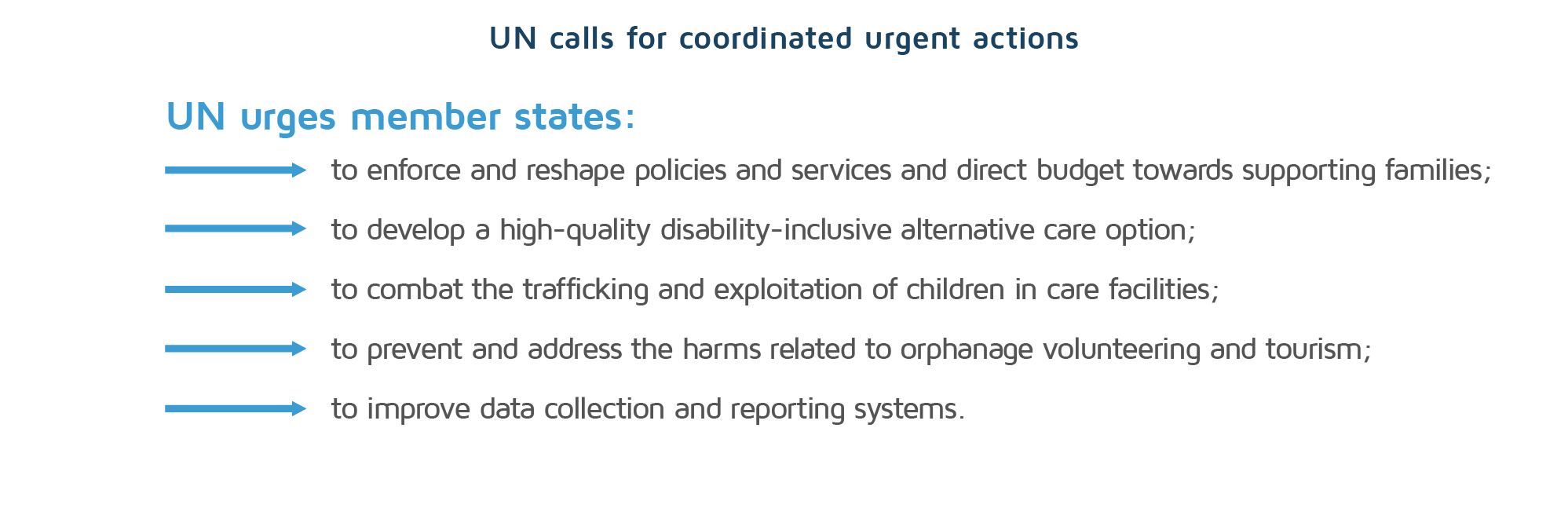Poverty, disabilities, discrimination, abuse or neglect have deprived millions of children around the world of a caring family and community. Globally, around eight million children live in institutional care with 80% of these having one or both parents still alive. Being separated from their families, children are unnecessarily exposed to the ill effects of early institutional experiences, which carry simultaneous damaging long-life consequences. All children currently in orphanages could be living in families – with their parents or other relatives, in foster care, through adoption or in care homes within from the community.
Most of them are not in fact orphans
Wrongly perceived as being the safest option, institutional care can severely harm children and several studies have revealed the existence of alarming irregularities such as emotional and physical abuse, beatings and punishment, sexual violence, neglect, undernutrition and bullying. Children are also sometimes kept in unacceptable and unhealthy conditions to appeal to donors and volunteers.
“Many children face a high level of abuse, violence, and neglect in residential care facilities. This environment is inappropriate for their emotional, physical, intellectual and social development. A lot of research has been done that shows that every three months spent in an institution represents a one-month delay in development. Institutions fail to provide children with important life skills required to live independently”, commented Mark Waddington, CEO of Hope and Homes for Children, the organization that is working alongside governments and civil society in over 30 countries of the world.
Poverty keeps children isolated from a family environment
The most significant incidence of children separated from their families can be observed in Europe and Central Asia, where it is more than five times higher than the global average of 120 children per 100,000. Poverty has been perceived to be one of the most common driver of child institutionalization.

Residential care, a last resort
Residential care should be a last resort for children separated from their parents. The deinstitutionalization process, the so-called transition of children from institutional to family and community-based care, should rely on preventing separation by providing adequate support to families and ensuring the process of leaving care focuses on social inclusion.
“We are seeking to take them back to families or alternative care, to ensure their reintegration in families and communities, where, more often, they face stigma and a struggle to readjust to the new realities. We capitalize on the opportunities to put in place the right support to make them happy. We are working hard to raise awareness, to persuade governments towards reshaping their policies and to dismantle residential care facilities”, added Mark Waddington, Hope and Homes for Children’s CEO.
Family care less expensive than residential
Despite the many challenges deinstitutionalization often involves, some governments have succeeded in registering impressive progress. In Moldova, one of the poorest countries in Europe, the number of children in residential care facilities has reduced by more than 90% during the last 13 years. In 2007 there were almost 12,000 children living in 67 institutions whereas in 2020 there are less than 1,000 children who remain trapped within the system.
“We faced great resistance from the representatives of the local authorities, managers of the institutions, local specialists, and even some parents who didn’t understand why they were encouraged to leave their children in residential care facilities as a better option for them and, suddenly, the perspective had changed and their children should return to the family. The reform’s success can be explained in terms of the involvement of civil society organizations, partnerships with representatives of the authorities, efforts oriented towards supporting families, the development of alternative services such as foster care and investments in inclusive education”, stated Lorina Ghițu, child protection specialsit at CCF/HHC Moldova.
Family-based care is a far better solution, both for children and societies as a whole, in terms of the lower costs and the much higher social return. Financing a child in a residential institution in Moldova costs around €5,000 a year while supporting a child to grow up in a foster family costs half that amount. Besides the economic perspective, the damaging repercussions on a child’s future cannot be overlooked.
“There is some magic associated with the family”
A meta-analysis of 75 studies found that children in residential care had an IQ 20 points lower than their peers in foster care and suffered from severe language delays. When placed in family environments, children can recover from problems experienced in institutions, even though they never completely catch up compared to those children who have never been institutionalized.
“We did realize that, after three months spent in a family, the child began to speak. Imagine how surprised I was to listen to him speaking after a long period of silence. There is some magic associated with family care that you can’t touch, you can’t explain”, confessed Innocent Habimfura, country director at Hope and Hopes for Children in Rwanda.
Huge progress has also been made in Rwanda since 2012 where almost 70% of children in institutions have been reintegrated with their families or placed in foster care. Innocent Habimfura pointed to the blatant crass irregularities of children’s institutionalization where there was an absence of thorough assessment, a lack of data and legal framework and inappropriate strategies to control the admission and release of children.
“These children are deprived of the right of knowing who they are and where they belong. It is a denial of your right to identity and a conviction to vulnerability and stigma. By living in an orphanage, the child develops a high level of dependence. He does not obtain practical and useful life skills. He is not involved in the process but, on the contrary, he is used to receive”, added Innocent.
Global commitment to end children’s institutionalization
Specialized organizations warn that supporting or volunteering in orphanages means sustaining environments that are utterly inappropriate for children’s emotional, cognitive and physical development. Supporting families and alternative family care services could end child institutionalization. Global leadership has shown commitment to protect children. For the first time, all 193 member states of the United Nations have formally recognised that orphanages harm children and have called for the progressive elimination of institutional care globally. The UN General Assembly in New York adopted a Resolution on the Rights of the Child on the tenth anniversary of the Guidelines for the Alternative Care of Children and the 30th anniversary of the UN Convention on the Rights of the Child.

The UN resolution highlights the necessity to adopt rapid practical interventions and prioritize family-based care. Meanwhile, millions of children are trapped in institutions that limit their possibilities and significantly impact their future.
Stay informed. Subscribe to DevelopentAid News and gain access to the latest information.

